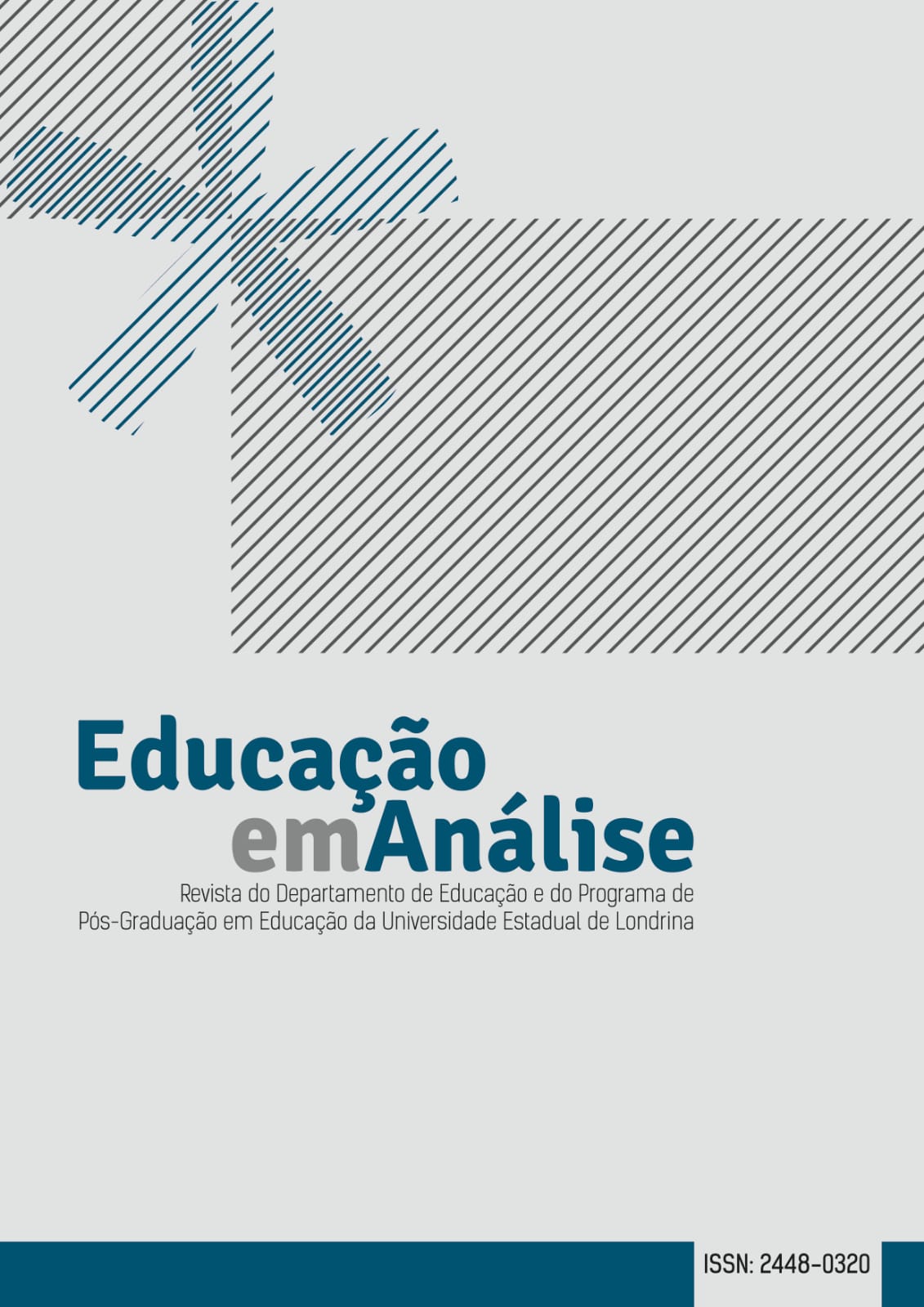Self-conservation and annullation of child being in times of enlarged technological domination
DOI:
https://doi.org/10.5433/1984-7939.2023v8n2p224Keywords:
Childhood. Industrial Society. Technology. Child Cultures.Abstract
The article aims to elucidate the link between technology and capitalist society, with its mode of production and social relationship, as well as weaves reflections on the way in which digital media operate and on the research that shows how the digital media it has been configured in the daily life of children and young people. The question that is placed is that the self-conservation of childhood, that is, its existence and its visibility in this context, presuppose its annulment, the dismissal of its identity and its cultures. The elected perspective is that of the critical theory of society, whereby evokes the memory of the emancipatory promise, even threatened by the adaptive power of the totality. Being like this, in this article it is not considered that childhood is destined to disappear, nor that it is unharmed by the integrative power of a highly rationalized and organized society, but is defended rather the need for an adequate appreciation of children's cultures.
Downloads
References
ADORNO, Theodor Wiesengrund. Minima moralia. Tradução de Luiz E. Bicca. 2. ed. São Paulo: Ática, 1993.
ADORNO, Theodor Wiesengrund. Tempo livre. In: ADORNO, Theodor Wiesengrud. Palavras e sinais: modelos críticos. Tradução de Maria H. Ruschel. 2. ed. Petrópolis: Vozes, 1995. p. 70-82.
ADORNO, Theodor Wiesengrund; HORKHEIMER, Max. Dialética do esclarecimento. Tradução de Guido A. de Almeida. Rio de Janeiro: Zahar, 1985.
ARANTES, Maria do Carmo Batista; MORAIS, Eduardo Alberto de. Exposição e uso de dispositivo de mídia na primeira infância. Residência Pediátrica, Rio de Janeiro, v. 12, n. 4, p. 1-6, out./dez. 2022. Disponível em: https://cdn.publisher.gn1.link/residenciapediatrica.com.br/pdf/v12n4aop535.pdf. Acesso em: 3 jun. 2023. DOI: https://doi.org/10.25060/residpediatr-2022.v12n4-535
BENJAMIN, Walter. Reflexões sobre a criança, o brinquedo e a educação. Tradução de Marcos V. Mazzari. 2. ed. São Paulo: Duas Cidades; Editora 34, 2009.
FRANCO, Márcia Elizabete Wilke. Compreendendo a infância como condição de criança. Porto Alegre: Mediação, 2006.
KISHIMOTO, Tizuko Morchida. Brinquedos e brincadeiras na Educação Infantil. In: SEMINÁRIO NACIONAL DO CURRÍCULO EM MOVIMENTO, 1., 2010, Belo Horizonte. Anais [...]. Belo Horizonte: Ministério da Educação, 2010. p. 1-20. Disponível em: http://portal.mec.gov.br/docman/dezembro-2010-pdf/7155-2-3-brinquedos-brincadeiras-tizuko-morchida/file. Acesso em: 29 nov. 2017.
MARCUSE, Herbert. A ideologia da sociedade industrial: o homem unidimensional. Tradução de Giasone Rebuá. 4. ed. Rio de Janeiro: Zahar, 1973.
MARCUSE, Herbert. Algumas implicações sociais da tecnologia moderna. In: MARCUSE, Herbert. Tecnologia, guerra e fascismo: coletânea de artigos de Herbert Marcuse. Tradução de Maria C. V. Borba. São Paulo: UNESP, 2001. p. 73-104.
SARMENTO, Manuel Jacinto. As culturas da infância nas encruzilhadas da 2. modernidade. In: SARMENTO, Manuel Jacinto; CERISARA, Ana Beatriz. Crianças e miúdos: perspectivas sociopedagógicas da infância e educação. Braga: Edições Asa, 2004. p. 9-30.
SARMENTO, Manuel Jacinto; PINTO, Manuel. As crianças e a infância: definindo conceitos, delimitando o campo. In: SARMENTO, Manuel Jacinto; PINTO, Manuel. As crianças: contextos e identidades. Braga: Universidade do Minho, 1997. p. 7-30.
TOCANTINS, Geusiane Miranda de Oliveira; WIGGERS, Ingrid Dittrich. Infâncias e mídias digitais: histórias de crianças e adolescentes sobre seus cotidianos. Cedes, Campinas, v. 41, n. 113, p. 76-83, jan./abr. 2021. DOI: https://doi.org/10.1590/CC231445. DOI: https://doi.org/10.1590/cc231445
TÜRCKE, Christoph. A cultura do déficit de atenção. In: PUCCI, Bruno; COSTA, Belarmino Cesar Guimarães da; SILVA, Luzia Batista Oliveira. Teoria crítica na era global. Rio de Janeiro: Nankin, 2016. p. 18-26.
TÜRCKE, Christoph. Sociedade excitada: filosofia da sensação. Campinas: Editora Unicamp, 2010.
VIGOTSKI, Lev Semionovich. Imaginação e criação na infância. Tradução de Zoia R. Prestes. São Paulo: Ática, 2009.
ZUIN, Antônio Álvaro Soares. (Des)memória e violência em tempos de mídia ubíqua. In: LASTÓRIA, Luiz Calmon Nabuco; CABOT, Mateu; ZUIN, Antônio Álvaro Soares (org.). Tecnologia, violência, memória: diagnósticos críticos da cultura contemporânea. Rio de Janeiro: Nankin, 2018. p. 193-204.
ZUIN, Vânia Gomes; ZUIN, Antônio Álvaro Soares. A indústria cultural algorítmica na era da internet das coisas. Educação e Filosofia, Uberlândia, v. 32, n. 66, p. 1131-1156, set./dez. 2018. DOI: https://doi.org/10.14393/REVEDFIL.issn.0102-6801.v32n66a2018-07. DOI: https://doi.org/10.14393/REVEDFIL.issn.0102-6801.v32n66a2018-07
Downloads
Published
How to Cite
Issue
Section
License
Copyright (c) 2023 Luciane Neuvald, Adonias Nelson da Luz, Rui Carlos Mayer

This work is licensed under a Creative Commons Attribution-NonCommercial 4.0 International License.
The journal reserves the right to make normative, orthographic and grammatical changes in the originals, with the aim of maintaining the cultured standard of the language and the credibility of the vehicle. It will, however, respect the authors' writing style. Alterations, corrections, or suggestions of a conceptual nature will be sent to the authors when necessary. In these cases, the articles, after being adequate, should be submitted to a new appreciation.









